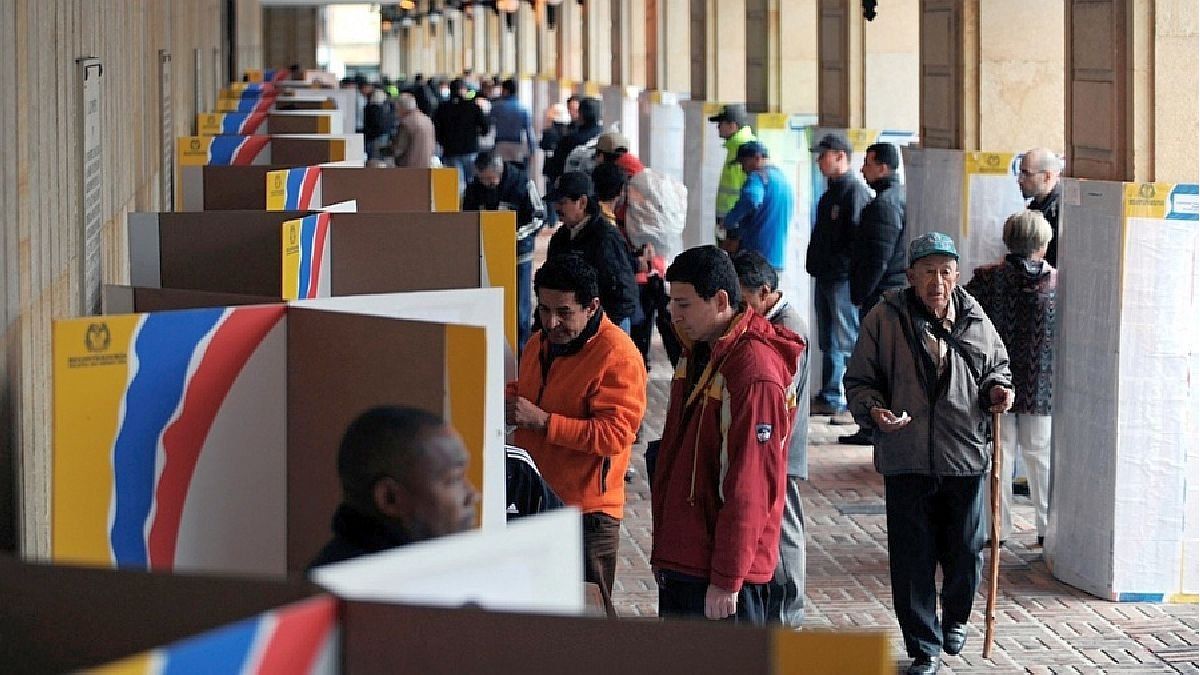Your opponent will be Rodolfo Hernandez (28% in the elections for “the Colombian Trump”), who presents himself as a pragmatic outsider. Civil engineer, businessman and also former mayor (surrounded by a meritocracy valued by his management), Hernández declares himself de-ideologized, alien to the establishment and the traditional parties, with a strong temperamental rhetoric and a direct speech through social networksmainly raising the flag against corruption.
As occurs in most latitudes of the planet, the lukewarm centrists have been left out (Sergio Fajardo deflated in recent weeks) and the inoperative status quo (‘Fico’ Gutierrez, who had the support of the traditional parties, was third, 5 points behind Hernández). It is the time of revolution and chaos, the biggest break with what was there. That everything changes (so that nothing changes?). It is that now that the ‘hurricane’ of the first round is over, there are not a few who consider that there are changes that are empty, that they are ‘political suicides’. And this not only generates doubt and fear, but also the need to self-generate a halo of pseudo-security that ties the voter back to the ‘firmness’ implied by the known past.
Gustavo Petro and Rodolfo Hernandez
The candidates for the presidential runoff in Colombia, Gustavo Petro and Rodolfo Hernández.
Photo: AFP
In the context described, the biggest problem for Petro in the second round is that he went from ‘change vs continuity’ if the candidate was Fico, to the ‘change vs change’, where Petro will seek to position himself as the predictable statesman against the ‘King of Tiktok’ and destabilizing change. Regarding this last point, his detractors do not agree: they are more concerned about the potential economic instability under a leftist government, the change in the relationship with the United States (without going any further, after the conflict unleashed in Ukraine, the government of Joe Biden launched a battery of negotiations to formalize Colombia as a non-NATO strategic ally) and Venezuela, or the balance of forces with a Congress with a conservative majority.
And here, too, rhetoric comes into play: What is the problem with all of the above? Or rather, How did Colombia fare – read the majority of Colombians – throughout its history with conservative governments? Just to mention one example, the old oligarchic and corporate framework has turned Colombia into one of the main suppliers of cocaine to the world. A regime of terror that has been sustained inside and outside of Colombia for decades.
But we are far from the questioning, so for Hernández everything seems to be simpler: bring together the still majority center-right/right that transports him to the first magistracy. Weird? No way. Since its independence two centuries ago, Colombia has never been governed by the left. And this also has its logic: It is the country with the highest concentration of land and the second most unequal in all of Latin America.
As a necessary complement, it has the full support of the traditional Colombian mass media, who have always prided themselves on being guardians and protectors of the institutional order. Of course, information management is subtle and effective; they do not boast of being conservative, and there is also a tacit agreement that certain episodes are not underlined, while the perception is rearranged to the civilizational concept with the strategy of fear (in this case to diabolical Petro-communism).
petro and hernandez.jpg

However, Who supports this logic? The establishment, those agrarian and ranching elites, Catholic and white, who have maintained power based on land, property, family and God. Just go to the statistics: until 2018, in 200 years of history, Colombians had been governed by only 40 families. Those who keep their mouths shut in the face of death – in the current Duque government alone, more than 300 social leaders have been murdered, to which must be added the 80 protesters who lost in the 2021 social uprising -, and foster the paradox of the staunch defense of economic libertarianism (including narco capitalism), while living off the State: Before being part of a competitive market, they benefit from its laws, its subsidies, its protection. A conjunction of factual powers (businessmen – who are the owners of the media -, politicians, the judicial and military caste), whose most profitable business is the ‘kidnapping’ of the government.
This systemic context has been forged based on three variables: a cautious economy without large jumps in consumption or growth (it is not surprising that in the ‘sea of informality’ that it is the Colombian labor market, the only way to ascend socially has been through illegality); the influence of the Church in education and the State (which declared itself secular only in 1991); and the absence of external migration. But some analysts also add a fourth variable: Colombia modernized and opened up to the world too late, allowing the authoritarian matrix to have a more lasting effect.
However, and despite the cunning of their elites to make coexist, on the one hand, the demagogic image of a violent, conservative and ignorant people and, on the other, a mechanism of terror to silence and frighten them – at the point of systematic murders at political, social and territorial leaders –, the popular sectors managed to articulate themselves into a political subject both in the streets and in instances of institutional representation: in recent years, the regions have articulated with each other, the country has connected with the world — in partly due to the emigration inherited from the violence — and the peace agreements opened up a new range of concerns in social and cultural issues. Also, During the last 20 years the left has managed, in a slow and tortuous way, to unify and create a certain electoral base; and this has been possible, without a doubt, and as has happened, for example, with the ‘Arab spring’, due to the powerful irruption of social networks as a determining factor in communication.
In short, it seems that the great enemy of the Colombian people is not the guerrillas, it is not communism, and it is not the insurgency; but it is the great inequality of the country that sustains the domination and privilege of the ruling classes. Petrismo, then, appears as a rescue of the clamor of popular and plebeian liberalism: the liberalism of agrarian reform, of the productive revolution, of the mitigation of inequality in rural and urban areas. A democratic and productive modernization of Colombia, in opposition to the large unproductive estate aligned with drug trafficking.
On the other hand, in front of the “live tasty” – The totalizing socio-economic development of the collective (care for the environment, feminist causes, support for sexual diversity, rights of indigenous peoples, improvements in health and public education, the generation of an energy transition towards a sustainable economic model) – of the candidate for vice-president of the Historical Pact, Francia Márquez, Hernández represents “entrepreneurship”, that individualism of classical liberal capitalism, where supposedly the ‘culture of effort’ It’s enough. We know that this is not the case: without education and financial capital (something that is scarce for the majority), reaching ‘Colombian Dream’ It is, plain and simple, almost impossible.
But it doesn’t matter that Hernandez doesn’t have a coherent program. Neither is his conceptual vagueness, his lack of manners. Even less his scant representativeness in easily identifiable power groups, nor that he has a demographically unbalancing territorial base. His rhetoric does not appeal to a memory or conjure up a very precise future, but it effectively connects with a present state of mind. In his appeal to common sense, he links dissatisfactions and represents miseries of position that focus on the perception of systemic corruption. It is that Hernández is, plain and simple, a candidate who embraces the volatility and inconsistency of the states of public opinion. And this not only strengthens it, but can be decisive because it affirms a central point: that apathy, discouragement, and the lack of situational understanding, both class and personal, are triumphing. A situation that is replicated throughout the world, including our country. And this, unfortunately, is not a good sign at all. Rather it is a worrying premonition.
Economist and Doctor in International Relations. Twitter: @KornblumPablo
Source: Ambito




